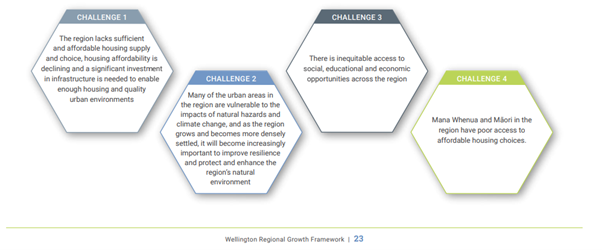The Wellington-Wairarapa-Horowhenua region is exposed to a wide range of natural hazards including earthquakes, landslides/slips, tsunamis, flooding and liquefaction. With over 12,300 kilometres of rivers and streams in the region, and over 500 kilometres of coastline, the region is also exposed to climate change impacts. Impacts of a changing regional climate will include increased coastal erosion and inundation, landslides, drought, water shortages, more frequent and intense storms, new pests and diseases and impacts on biodiversity and ocean acidification.
The WRGF Challenge #2* is: “Many of the urban areas in the region are vulnerable to the impacts of natural hazards and climate change, and as the region grows and becomes more densely settled, it will become increasingly important to improve resilience and protect and enhance the region’s natural environment”
* – Wellington Regional Growth Framework

Climate Action is all of us – a cross-community regional effort
Climate action is a cross-community regional effort. If we consider district-wide climate action as the responsibility of one specific team within our organisation, we guarantee failure. Climate change will impact all aspects of our region, our lives and economy in various ways. To be successful in supporting our district to transition to a low-carbon future that is resilient to climate impacts, we need to be working in a coordinated and regional approach. The ‘climate’ does not stop at council boundaries.
Phase 1: Regional Climate Change Impact Assessment
The region is subject to increasing risks from climate change that will need to be carefully managed. The development of Wellington Regional Climate Change Impact Assessment will bring together a consistent regional evidence base of the climate change risks and impacts over the next century. The assessment will provide findings regarding impacts to our communities, infrastructure, natural ecosystems, economy, and governance systems.
The information will support the region to apply an evidence-based approach to climate-resilient development in the region.
Phase 2: Regional Adaptation Plan
The second phase is to develop an Adaptation Plan in response to the findings in the Impact Assessment. The Adaptation Plan will focus on climate-resilient development in the region.
The project aims to:
- Inform development projects in the region to increase community resilience to climate change long-term
- To develop a tika approach to climate change adaptation in the region, including how to embed mana whenua priorities, mātauranga and Te Ao Māori concepts into climate change risk management.
- Create an actionable Regional Adaptation Plan the priorities the key opportunities for strengthening climate resilient development
The story of the WRCCIA Project so far (2min)
This two minute video introduces the WRCCIA team, what we aim to achieve, how we will work, and the desired outcomes for our region and it’s communities. We hope you find it useful and welcome your questions and comments.

